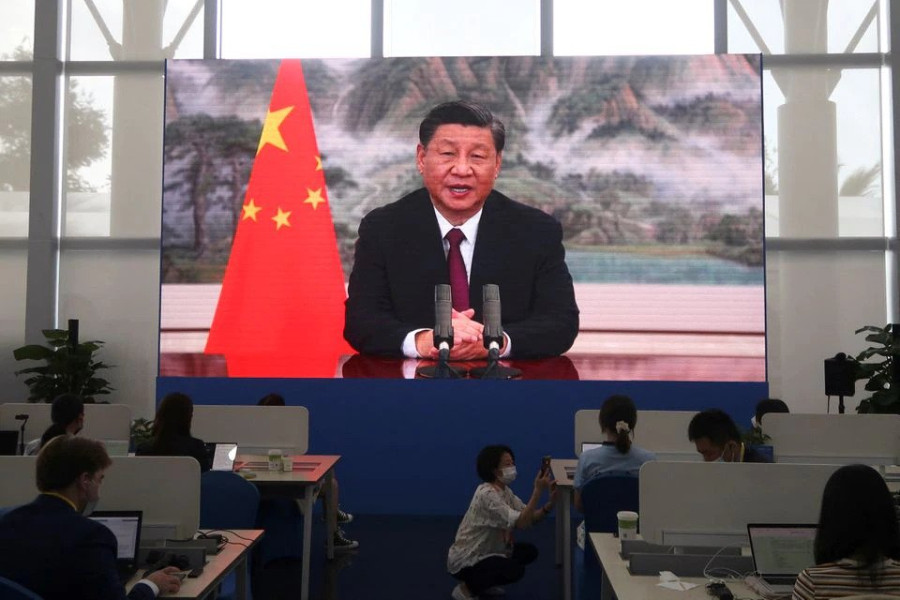National
Nepal on the horns of dilemma over China’s Global Security Initiative
Experts say Kathmandu should stay away from Chinese President Xi’s concept.
Anil Giri
On Tuesday, former Deputy Prime Minister and Minister for Foreign Affairs Sujata Koirala sought the government’s position on the Global Security Initiative (GSI) pushed by Chinese President Xi Jinping and first announced at the Boao Forum for Asia in April.
Speaking in Parliament, Koirala, who is also a senior Nepali Congress leader, also asked whether the government had decided to participate in the GSI.
Although China is yet to release the GSI’s actual blueprint, Chinese authorities, on three back to back occasions in the recent past, have insisted that Nepal supports the Beijing-led Global Security Initiative and Global Development Initiative. But the Ministry of Foreign Affairs is yet to react to the Chinese claim, particularly on the GSI.
Foreign policy observers and security experts said that Nepal should carefully study any issue related to security, military and strategic affairs initiated by a country or bloc and should do nothing to turn the country into a hub for geo-political rivalry and competition.
According Vice Foreign Minister of China Le Yucheng, the idea behind the GSI is to take a new vision on security as the guiding principle, mutual respect as the fundamental requirement, indivisible security as the important principle, and building a security community as the long-term goal–all in order to foster a new type of security that replaces confrontation, alliance and a zero-sum approach with dialogue, partnership and win-win results.
“This major initiative carries forward the spirit of the UN Charter, offers a fundamental solution to eliminating the peace deficit and contributes Chinese perspectives to meeting international security challenges,” Le had said in his speech on May 6 in Beijing.
Nepal’s Foreign Ministry officials, however, said Nepal has not specifically committed to joining the GSI.
“Yes, we supported the Global Development Initiative including on platforms like the United Nations and others, but there is no communication and commitment to the initiative,” a senior foreign ministry official said, requesting anonymity.
Earlier on July 6, writing an opinion piece in the Post, Chinese ambassador to Nepal Hou Yanqi said the Nepali side actively supports and responds to the Global Development and Security Initiative.
“China and Nepal share the same or similar views and propositions in adhering to the priority of development, the harmonious coexistence of man and nature, and the vision of common, comprehensive, cooperative and sustainable security,” she wrote.
Later in August, after the meeting between Foreign Minister Narayan Khadka and his Chinese counterpart Wang Yi in the Chinese city of Qingdao, the Chinese side again insisted that Nepal agrees with the concept of the Global Development Initiative and the Global Security Initiative, and is willing to actively study and participate in the connection, according to the statement issued by China’s Ministry of Foreign Affairs.
But the statement issued by the Nepali side on the same occasion is silent on the GSI.
Again, last week, Wang Yang, chairman of the Chinese People's Political Consultative Conference (CPPCC) National Committee, again brought up the issue during his virtual meeting with National Assembly Chairman Ganesh Timilsina.
Among other things, according to Xinhua, the Chinese state-owned news agency, Wang told Timilisina that China welcomes Nepal to support and participate in the Global Development Initiative and the Global Security Initiative.
“On all three occasions, the foreign ministry remained silent. As per Nepal's stated foreign policy, Nepal does not participate or be a part of any security alliance. I request the government to make this clear in public interest,” said lawmaker Koirala. “It is our policy not to be part of any alliance and Nepal adheres to and respects the policy of non-alignment.”
Successive governments in Kathmandu have been opting out of all security alliances and this position became more vocal after Nepal refused to participate in a BIMSTEC joint military drill in September 2018. Later, Nepal refused to join two more security related initiatives forwarded by the United States by the earlier government of KP Oli and then the current Sher Bahadur Deuba government.
The Oli government declined a US request to participate in the US-led Indo-Pacific Strategy, which became hugely controversial in the run-up to the parliamentary passage of the $500 million Millennium Challenge Corporation Nepal Compact.
Recently, the Sher Bahadur Deuba government refused to join the State Partnership Program of the US government saying that it carries military and security components and goes against Nepal’s stated foreign policy of non-alignment.
Foreign policy observers and experts, citing Nepal’s foreign policy position, said the country should not rush to join the GSI without studying its possible ramifications.
“Our fundamental understanding with China or any other foreign country is to participate in development initiatives, not in security and military alliances,” said Geja Wagle, a foreign affairs and security expert.
“China has been insisting that Nepal support the GSI, but our foreign policy doctrine does not allow us to join any security or military alliance or bloc. In line with the policy, Nepal accepted the MCC compact but stayed away from the SPP, for the latter carries military and security components. So I do not see any basis for Nepal to join the GSI,” said Wagle.
Other security experts echo Wagle.
Former Nepal Army Major General Purna Silwal says Nepal should stay away from the Chinese GSI in the same way it avoided being part of the US-sponsored SPP.
“The US and China are trying to counterbalance each other and want friendly countries to join their initiatives and programmes. How can we join the GSI without studying it in detail? It is too early to take a position on the GSI,” said Silwal.
But the Ministry of Foreign Affairs is yet to decide on the issue, said a ministry official requesting anonymity.
Sewa Lamsal, foreign ministry spokesperson, did not respond to the Post’s phone calls for comments.




 16.12°C Kathmandu
16.12°C Kathmandu















